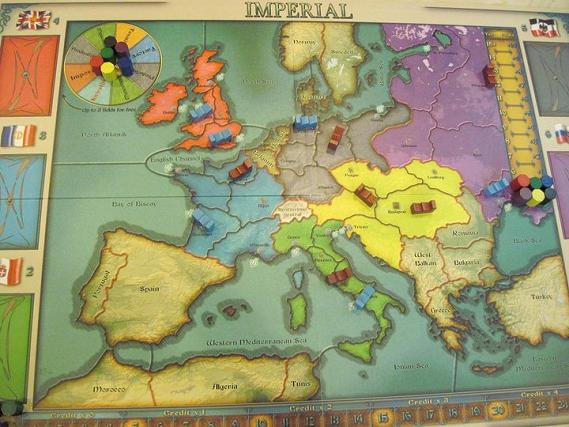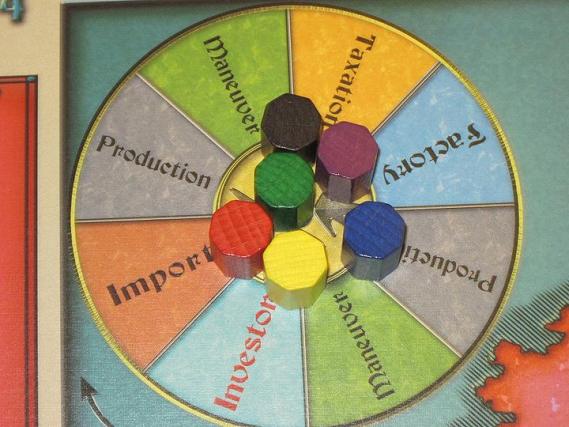
Imperial is one odd game that looks a lot like a wargame but is in fact an economic one. I had a hard time getting to grips with it as it wasn’t immediately clear to me what you’re supposed to do. Instead of directly incarnating nations, each player is an investor (or war profiteer depending on how you look at it) who can lend money to the nation-states of the pre-World War I era this game is set in. Whoever owns most of a nation’s outstanding bonds gets to control that nation. Victory points are derived by multiplying the value of the bonds you own for each nation by a score representing that nation’s relative power.
- We played with variant rules that omitted the Investor card because Sean felt that using the card would make the game slower. After checking out the rules myself, I’m not sure that this is necessarily true. There will be fewer buying opportunities, yes, but not that much fewer. On the hand, the player holding the investor card gets a free $2 million with which to buy more bonds. Over time, that ought to increase the amount of money flowing into the game significantly and make more buying possible.
- There are two ways to increase a nation’s power. To use its armies and ships to occupy neutral territories, including sea areas, or to fill its home provinces with factories. Most of us spent most of our effort at occupying territory because it’s free, needing only to move a troop unit into it and you don’t even need to maintain a unit there to keep control of it. Of course, it then becomes tempting for other nations to try to grab them away. I think all of us built factories in three out of the five provinces and then stopped. They’re expensive and while a hostile nation can occupy one of your provinces to knock out the value of the factory there, they don’t gain anything from it. I think it would be interesting to see how a strategy focused on defensively building factories would work.
- In our game, Shan very aggressively gained control over many countries, owning Italy, Germany and England at the same time for a good long while. Unfortunately for her, she tended to buy into countries that no one else had interests in, so she was more or less at war all the time with the rest of us. For my part, I controlled France throughout the entire game and I think I ran it pretty well. Unfortunately for me, both Sean and Chee Wee were able to just about match my investments in France and so benefited from French’s good fortune as well. At the same time, they also had big investments in other countries, and so scored higher than me.

- I ended up earning less money personally because I was too reluctant to use the Investor action which would result in everyone holding French bonds being paid a dividend. I just didn’t want Sean and Chee Wee to piggyback on my action. In retrospect, I should have earned the dividend and used the proceeds to increase the gap between the bonds I held and the bonds held by the others so that I needn’t be so worried about the piggybacking effect.
- Sean used what I later realized was the very shrewd strategy of trying to match everyone’s holdings, except for Shan’s as she was more or less isolated, and then owning a bit extra on top of that. Since the actual scores can’t be known until the end of the game since you can’t perfectly predict how far each nation will advance down the power track, it’s a handy way to ensure that he would always be on top no matter what happens.
- Chee Wee demonstrated that provided it is cheap enough, you can usefully gain control of a nation even if you don’t expect it to score well. In his case, he gained control of England from Shan just to use it as a weapon to beat down on Germany, which was also controlled by Shan.
- The game uses a rondel system for nation-specific actions. Sean mentioned that this game’s designer is known for such rondels. I can’t recall any game using something like this except Macao. The rondel used here doesn’t seem especially notable. I guess the main benefit is that it allows you to implement a number of different action options for each nation in a very small space on the board.
Imperial is one of those games that I would have played completely differently if I had understood better how it worked. The mechanic of the control of a nation switching between players is a new one to me and I wonder how closely it resembles the share mechanic in the 18xx series of games which I’ve never played. In any case, it’s certainly a good game that deserves the wide following it apparently has.
Leave a Reply